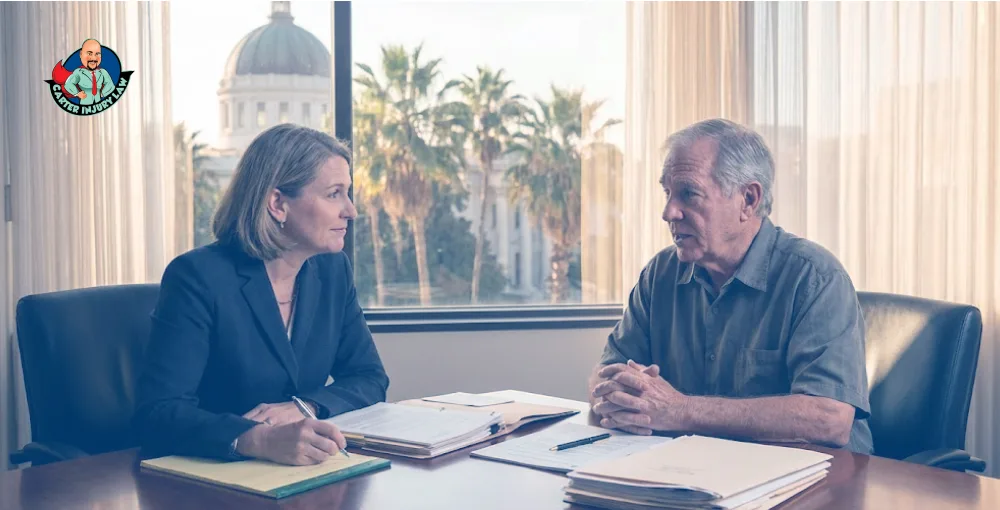They say old age brings peace, a quiet dignity earned after decades of noise. But what happens when that peace is betrayed behind closed doors, when the people meant to care are the ones who cause harm? It’s not always loud. Sometimes it’s a bedsore that’s been ignored. Other times, it’s a bruise that shouldn’t be there or an empty bank account that no one can explain.
Nursing home abuse doesn’t always scream. We’ve seen what it does to families. We’ve seen the guilt, the anger, the disbelief. And we’ve also seen what it takes to fight back.
So if you’re here wondering what happens next… If you suspect something’s wrong and you’re not sure what to do about it, you’re in the right place.
1) Types of Nursing Home Abuse to Watch For
When you place a loved one in a nursing home, you’re putting your trust in the hands of people you assume are trained, responsible, and above all— caring. But sometimes, that trust gets shattered. And abuse isn’t always obvious. It takes many forms. Here’s what you should be looking out for.
Neglect and Abandonment in Nursing Homes: The Quiet Harm
This is one of the most common issues we see. It’s not always dramatic, but it’s devastating. Think about someone who can’t move on their own, lying in bed for hours or days without being turned. That’s how bedsores start, and they can become serious medical problems if left untreated.
We’ve seen cases where someone tries to get up, falls, and stays on the floor because no one checked on them. That’s not an accident; that’s neglect. Caretakers might be off watching TV, on a smoke break that never ends, or just flat-out ignoring their responsibilities. Whatever the excuse, it’s unacceptable.
Physical Abuse: When Care Turns Violent
This one is more direct. Physical abuse can look like unexplained bruises, bleeding, cuts, swelling, or worse. It can happen in a moment of frustration, or it can be a repeated pattern. Either way, there’s no excuse for putting hands on a vulnerable senior in anger or punishment.
And just because someone doesn’t report it doesn’t mean it didn’t happen. Many elders won’t or can’t speak up. So if something feels off, trust your instincts.
Sexual Abuse: The Unthinkable
We don’t like to talk about this one, but we have to. Sexual abuse happens in nursing homes, and it’s every bit as horrific as you’d imagine. These are often the most emotionally difficult cases, not just for the families, but for us too.
We’re not going into graphic detail here, but know this: if something seems wrong, if you see signs you can’t explain, or if your loved one’s behavior suddenly changes, you need to ask questions. This type of abuse needs to be confronted head-on, and the people responsible must be held accountable.
Financial Exploitation: Theft Disguised as Help
Sometimes the abuse doesn’t leave bruises—it drains bank accounts. We’ve seen staff members manipulate patients with cognitive decline into signing over checks, granting powers of attorney, or even changing their wills.
When someone’s mental state is compromised, they’re an easy target. And unfortunately, there are people out there who take advantage of that. Keep an eye on bank statements. If something doesn’t add up, don’t brush it off.
2) What You Can Do as a Family Member
When someone you love is living in a nursing home, you are their biggest line of defense. You're not just visiting—you’re watching, listening, and protecting. And that vigilance can make all the difference.
Look Closer Than What They Show You
Don’t just sit by their bedside and chat for a few minutes—look. Really look. Check their arms, their legs, their back. Bedsores don’t always show up right away, and bruises can be hidden under clothing. If your loved one can’t tell you what’s going on, their body might.
Ask Questions, Even the Hard Ones
It might feel awkward, but ask. “Has anyone hurt you?” “Do you feel safe here?” “Has anyone touched you or taken anything from you?” If they can answer, give them the space and the comfort to do it. If they can’t, your job is to speak up on their behalf.
Talk to the Staff And Listen to What They Don’t Say
You don’t need to be confrontational, but pay attention to how the staff responds when you ask about care. Do they get defensive? Do they dodge your questions? You can learn a lot from how someone avoids eye contact or gives vague answers. If something feels off, it probably is.
Keep an Eye on the Money
This one catches a lot of people off guard. Review their accounts. Look for strange withdrawals or changes in who’s authorized to access funds. If your loved one suddenly has a new “friend” helping with paperwork or making financial decisions, that’s a red flag. Financial abuse can happen right under your nose if you’re not paying attention.
Trust Your Heart
At the end of the day, no one knows your parent, grandparent, or sibling like you do. If something feels wrong, you don’t need to wait for proof. You have every right to ask questions, demand answers, and, if needed, call a lawyer. That kind of intuition has helped families catch abuse early and stop it before it gets worse.
3) What to Expect If You File a Lawsuit
If you think you have a nursing home abuse case, it helps to know what’s ahead. This process can feel overwhelming, especially during an already emotional time, but we walk our clients through every step with care. Here’s how it usually goes:
The First Call Is Free And It Matters
We start with a consultation. No pressure, no cost, and no obligation. You tell us what happened, we ask some questions, and if it sounds like there’s something to look into, we dig deeper.
One of the first things we’ll do is request the nursing home’s insurance information. Florida law gives us the right to see what coverage they have that helps us figure out if this is a claim we can pursue and how to structure it.
Medical Records Tell the Story
Once we’ve confirmed there’s a potential case, we need to get our hands on the medical records. These records often show what the nursing home did or didn’t do and whether those choices led to harm.
If your loved one has passed, we may need to help you get an estate set up so we can access those records legally. That doesn’t mean you have to file a probate case or go through a big legal process. We can connect you with someone who handles that part. But getting that estate in place can help us move the claim forward with clarity. I’m sure this is already on your radar, but… Should You Accept an Insurance Company’s Offer to Pay Your Medical Bills After an Accident?
The Notice of Intent Starts the Clock
Before we can sue a nursing home in Florida, we’re required to send what’s called a Notice of Intent. It’s basically a formal letter saying, “We believe you caused harm, and we’re planning to file a lawsuit.”
Once that notice goes out, a 75-day countdown begins. During that time, both sides are allowed to request documents and conduct an informal investigation. Sometimes, they’ll ask for mediation. Sometimes, they ignore it altogether. Either way, this period gives us a window to gather facts and see if the case can be resolved without going straight to court.
Still wondering how this process works in real life? Attorney David Carter breaks it down in this short video—what happens when you call, what we look for, and how we begin building your case from day one.
4) When the Case Doesn’t Settle: What Happens Next
Sometimes, despite our best efforts during that pre-suit period, the case doesn’t settle. Maybe the nursing home denies responsibility, maybe they lowball the offer, whatever the reason, we don’t stop there.
When It’s Time to File
If we don’t get a fair resolution during the pre-suit window, we move forward and file the lawsuit. That officially kicks off the litigation process. We don’t do this lightly but if it’s what your loved one deserves, we’re going all in.
Discovery: Digging for the Truth
Once the case is filed, both sides begin what’s called discovery. This is where we start asking questions under oath, like taking depositions of staff members, reviewing internal records, and gathering evidence about what really happened behind those nursing home doors.
This phase helps us build your case piece by piece, showing not just that something bad happened, but why it happened and who’s responsible.
Trial Is the Last Stop but It’s on the Table
Most of the time, these cases don’t go all the way to trial. We hope they don’t. A fair settlement, something that provides closure and accountability, is always the goal. However, if the nursing home won’t step up and take responsibility, we’re ready to take it to court. We’ve done it before, and we’ll do it again if that’s what it takes.
You Don’t Pay Us Unless We Win And That’s a Promise
There’s no financial risk in calling us. We don’t charge for consultations. You don’t owe us a dime unless we take your case and win. We work on a contingency fee arrangement. That means you can get answers, guidance, and peace of mind without worrying about the bill.
Whether it’s the middle of the day or late at night, we’re here to listen. We’ll look over the records, ask the right questions, and help you figure out if you have a case. Even if it turns out you don’t, at least you’ll know. And if you do, you’ll have a team ready to fight like hell for your loved one.
Talking about what happened isn’t easy. For some families, the details are too painful to speak aloud. That’s okay. We’ve been through this with clients before, and we understand how to approach these conversations carefully. We ask the questions we need to build your case, but we never forget that behind every question is someone who’s been through hell.












